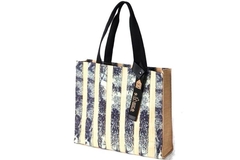Chinese start-up introduces souvenir bags made from plastic waste
Beijing-based start-up Bottloop Environmental Technology has partnered with the Palace Museum, China, to offer upcycled plastic waste-based souvenir bags at the museum.
PET and synthetic fibers are primarily petroleum-based, allowing PET bottles and other plastics to be transformed into fabric, which is then crafted into a tote bag featuring a design inspired by a traditional Chinese ink painting.
Bottloop’s process begins with sorting, cleaning, and separation technologies that convert materials like PP, PE, and discarded fishing nets into high-quality polyester granules.
Liu Xuesong, founder of Beijing Bottloop Environmental Technology, says: “Environmental protection is not just about lecturing the public.”
Liu shares that creativity can turn everyday waste into beautiful, functional souvenirs. She hopes that young consumers choose their souvenirs because of the intricate designs and eco-friendly stories behind them.
Blockchain-traced bags
The Palace Museum, which is on the site of China’s Forbidden City, provides souvenir and stationary products that are inspired by centuries-old treasures.
Its collaboration with Bottloop aims to meet the growing trend of integrating environmental responsibility with cultural preservation.
Bottloop has created a 12-step regeneration process, including multi-stage purification and fiber production, for PET plastic bottles to become soft, silk-like fabrics used in the museum’s eco-conscious souvenir collection.
Liu explains that the recycled plastic products are cleaned and shredded into small flakes. These flakes are then melted and extruded into yarn, which is spun into thread and ultimately woven into rolls of fabric.
Bottloop adopts a blockchain traceability system, which monitors the full lifecycle of its products, from plastic bottle waste to finished goods, while tracking the carbon footprint. This data-driven approach provides corporate clients with low-carbon solutions.











